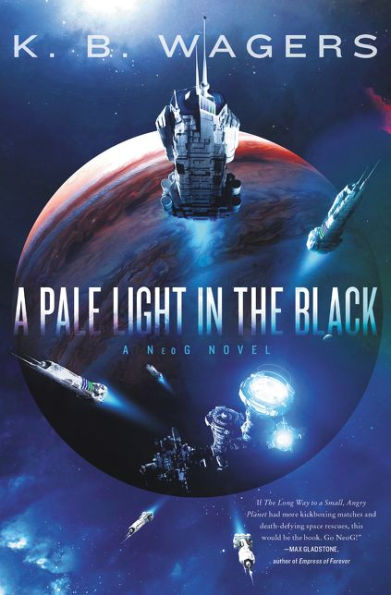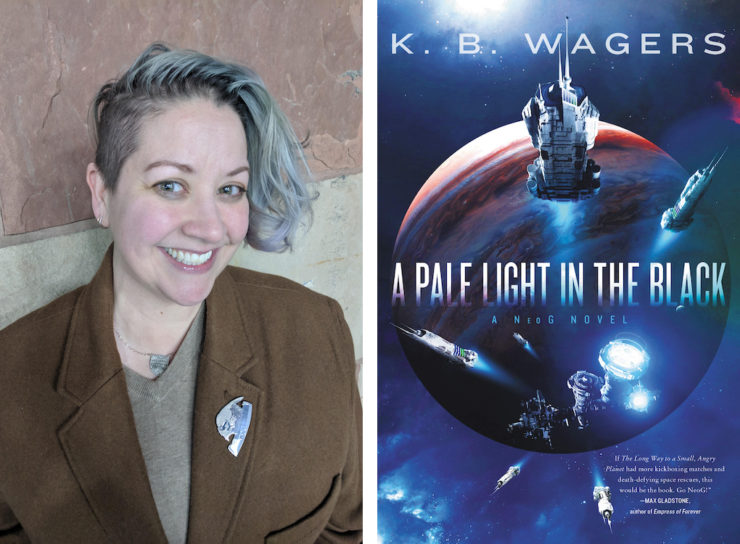K.B. Wagers is the author of the amazing Indranan War (Behind the Throne, After the Crown, Beyond the Empire) trilogy, a story which continues in the dangerously tense There Before the Chaos and Down Among the Dead. Their latest novel marks a departure from the epic space-empire scale: A Pale Light in the Black (Harper Voyager, March) is set in a new universe and follows the hijinks of a crew in the Near Earth Orbital Guard, as they prepare for the annual competition of the Boarding Games while getting used to a new lieutenant—a young woman trying to get out from under the influence of her powerful family—and stumbling into a dangerous conspiracy.
They’re joining us today to answer a few questions, so let’s get to it!
LB: Years ago, when I started doing these Q&As, I would open with a question along the lines of “WOMEN!—as authors, as characters, or as fans and commenters how are they received within the SFF genre community, in your view?” These days I think it’s important to expand that question a little bit more. How do you feel women (especially queer women), and nonbinary people (or people of other marginalised genders) are received as creators, characters, and participants in the SFF field?
KBW: My own experience over the last few years had been very positive in regards to this, but I also go to relatively great care to limit my exposure to crap for my own mental health. I do think on the whole that the shift is happening. That we’re seeing a SFF field that’s closer to what a lot of us dreamed of as a future out in the stars. A future that has more diversity and less gate-keeping, more stories filled with people of many races and backgrounds, more openness about gender, more everything. So in the end, like it or not, we’re here and there are people just like us who are very happy to have us. I have a lot of hope for the SFF field in the next several decades.
LB: Second question! Your first trilogy has been compared to Star Wars but with more matriarchy and more believable politics (I may have been one of the people doing the comparing). What do you think of the comparison, and what’s the appeal of a big space opera universe for you?
Buy the Book


A Pale Light in the Black
KBW: As a long-time fan of Star Wars (I had, gosh, were they the Mattel toys from the ’80s?), it was more than a little wild to have that comparison happen, between that and someone comparing Hail to Honor Harrington I’m pretty sure I was speechless more than a few times! So the comparison is a delight and an honor. I dedicated Beyond the Empire to Carrie Fisher because I finished it shortly after she died and like so many people her death really hit me hard.
The appeal of space opera is probably 10% space interests and 90% my childhood. Or possibly the other way around. *laughs* I’ve always loved science fiction and space and everything under the sun. Perhaps surprisingly, several of the first novels I wrote weren’t science fiction but were instead fantasy and urban fantasy. It wasn’t until about 2010 that I found my feet writing in space opera—just a few years too early for the market! I’ve still got a slightly wacky Hitchhiker’s Guide to the Galaxy style space opera I couldn’t find a taker on that I wrote before Behind the Throne.
LB: Third question. Space governments—and space matriarchies. In the Indranan War and the Farian War trilogies, you show several different kinds of government—monarchies and otherwise (in the Farian War, even religiously-inflected government). What led to the decision to make Indrana a matriarchy? What influenced how you built up Indranan society, and how you approached the question of gender equality from the point of view of a society that historically put women on top?
KBW: his is a great question! I remember having a convo back in the days of Live Journal about why so many science fiction stories seemed to backslide as far as governing went by going the kingdom or empire route. We had a great talk about it, including discussing how the dangers of space exploration in the early days would potentially lead to this sort of regression. When I came up with the idea of Behind the Throne it wasn’t so much a conscious decision as hearing Emmory’s “Princess Hailimi Mercedes Jaya Bristol, your empress-mother, and the whole of the empire need you to return home.” in my head and rolling with it from there.
So often when we read stories about matriarchies they’re completely over the top, men subjugated, narratives. I really wanted to highlight just how pervasive the patriarchy is in our society by flipping everything on its head in Hail’s world (or rather in Indrana). It was a fascinating exercise in how a culture that was truly a matriarchy would have evolved with different language base, how putting women into every possible role I could think of would lay out a scene, and how my own internalized misogyny would time and again rear its head. (The original draft of this story was vastly different from what ended up in stores.) I did some things very deliberately—Emmory “loading” his BodyGuard teams with men and getting heat for it. Hail’s own attitude differing because of the time she’d spent away from home. And picking some very specific characters as sacrifices throughout the trilogy.
In the end, I made the choice to set Indrana up this way because I was just so tired of the all-white, all-male (or nearly all male) science fiction stories that dominated a large part of my teenage and young adult years. I wanted to write something I would want to read and thought that maybe other people out there were also looking for the same thing.
LB: I understand HarperVoyager solicited you to write for them with the NeoG series. Tell us a little about that, and the differences between that and your Indranan War/Farian War books?
KBW: Legitimately the first thing out of my mouth when my agent called to tell me that David Pomerico wanted to chat about creating a new series was: “Me? Why?” Because impostor syndrome is a heck of a thing, isn’t it? On top of that there was a pretty serious discussion about what adding another book onto my schedule would do to said schedule. I don’t regret it in the slightest, but I admit that I’ve spend a lot of time cursing Past Katy under my breath for doing this to me.
But the chance to create a whole new world has been beyond amazing and I’m so grateful to David and all the folks at Harper Voyager for their support and enthusiasm for the NeoG novels. What started as a vague idea that David tossed my way and told me to run with in any direction I wanted has evolved into some of the most fun writing I’ve done in a long time. A Pale Light in the Black is about hope and about family which, if I’m being honest are themes that show up in the Indranan/Farian War books also but with a decidedly different feel. It’s about humanity at its best, about people just doing their jobs and living their lives, and—which I really can’t believe sometimes—sports. The Boarding Games were way more fun to write than I expected (and resulted in some surprising logistical challenges to boot, you can check out my website sometime after March 3rd for all the brackets I had to put together to keep things straight).
Which, *laughs* speaking of straight this book is decidedly not and it’s one of the best things about it. It’s just a whole lot of people living their lives, loving who they want to love, and proving that none of that indicates how well you do your job or how good a person you are. I am beyond ecstatic that I got to write this book and this world populated with folks like me.
LB: When you think about the books that have left a deep impression on you, or the works that have influenced you—or that you’re conscious of your own work reacting to—what comes to mind? Can you tell us a little about the reasons?
KBW: Every time I get asked this question the first thing that pops to my mind is Douglas Adams’s Hitchhiker’s Guide to the Galaxy because I feel like the joy and absurdity are things that have stuck with me throughout numerous attempted novels. Add to that a steady diet of British science fiction shows like Doctor Who and Red Dwarf as well as things like the Muppet Show? Well, it’s not much of a surprise I turned out as strange as I did. So I feel like I’m always reaching for that sense of wonder that those things imparted into the world. I want my writing to bring folks the same kind of joy.
I’ve also got a healthy appreciation for the weirdness of Russian stories and something like Ekaterina Sedia’s The Secret History of Moscow has stuck with me years after reading. More recently I’m into those really strange feeling books that don’t tell stories the way you would normally expect like Karen Osborne’s upcoming Architects of Memory or Tochi Onyebuchi’s Riot Baby. In what may seem like a paradox from the above statement, I’m okay with stories that don’t give us truly happy endings but leave us just a little unsettled at the end of it all.
LB: What works or authors are you most excited about or interested in right now? What do you recommend?
KBW: I’ll be brutally honest, I haven’t had a lot of time for reading but boy is my TBR bookshelf screaming in anticipation of me taking the rest of the year off, so I’m not going to name anyone specific because my actual list of books I’ve read lately is super pitiful right now.
Rather, I’d like to challenge folks to look for books they wouldn’t normally pick up, especially stories told by marginalized creators. Read BIPOC books written by Black, Indigenous, and authors of color. Read queer books written by queer authors. Read books about disabled people written by actual disable folks. But more than that, champion them, encourage your friends to read wider and with more daring. Sit down and interrogate why things make you feel uncomfortable rather than immediately dismissing them. The world is changing, for the better I hope despite everything going on right now. It’s time for us to change also. We all need to do this work and speak up about how important it is to read stories that don’t center the voices that have been held up as the standard for so long especially in science fiction and fantasy.
Read outside your comfort zone.
Liz Bourke is a cranky queer person who reads books. She holds a Ph.D in Classics from Trinity College, Dublin. Her first book, Sleeping With Monsters, a collection of reviews and criticism, was published in 2017 by Aqueduct Press. It was a finalist for the 2018 Locus Awards and was nominated for a 2018 Hugo Award in Best Related Work. Find her at her blog or at her Twitter. She supports the work of the Irish Refugee Council, the Transgender Equality Network Ireland, and the Abortion Rights Campaign.










